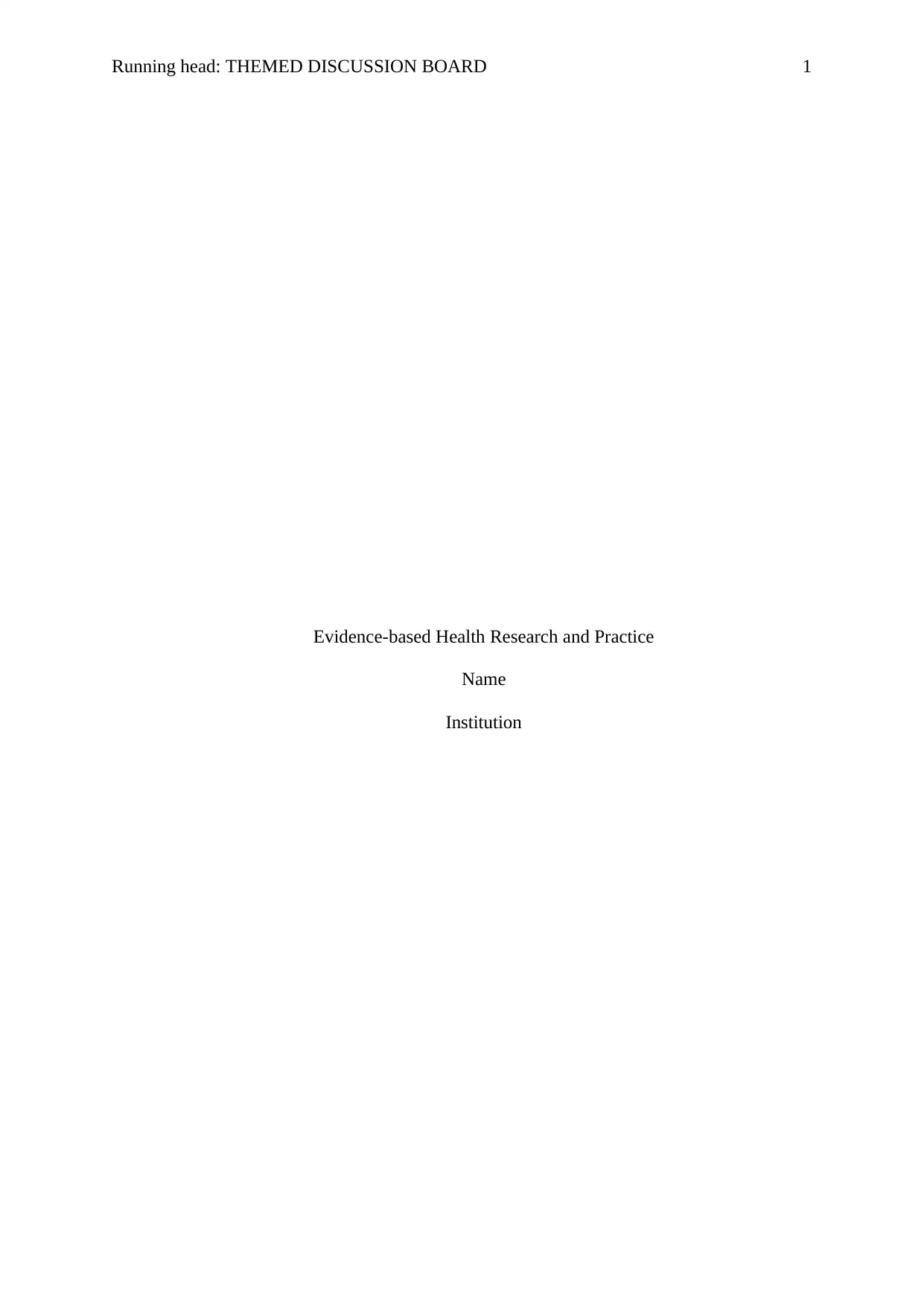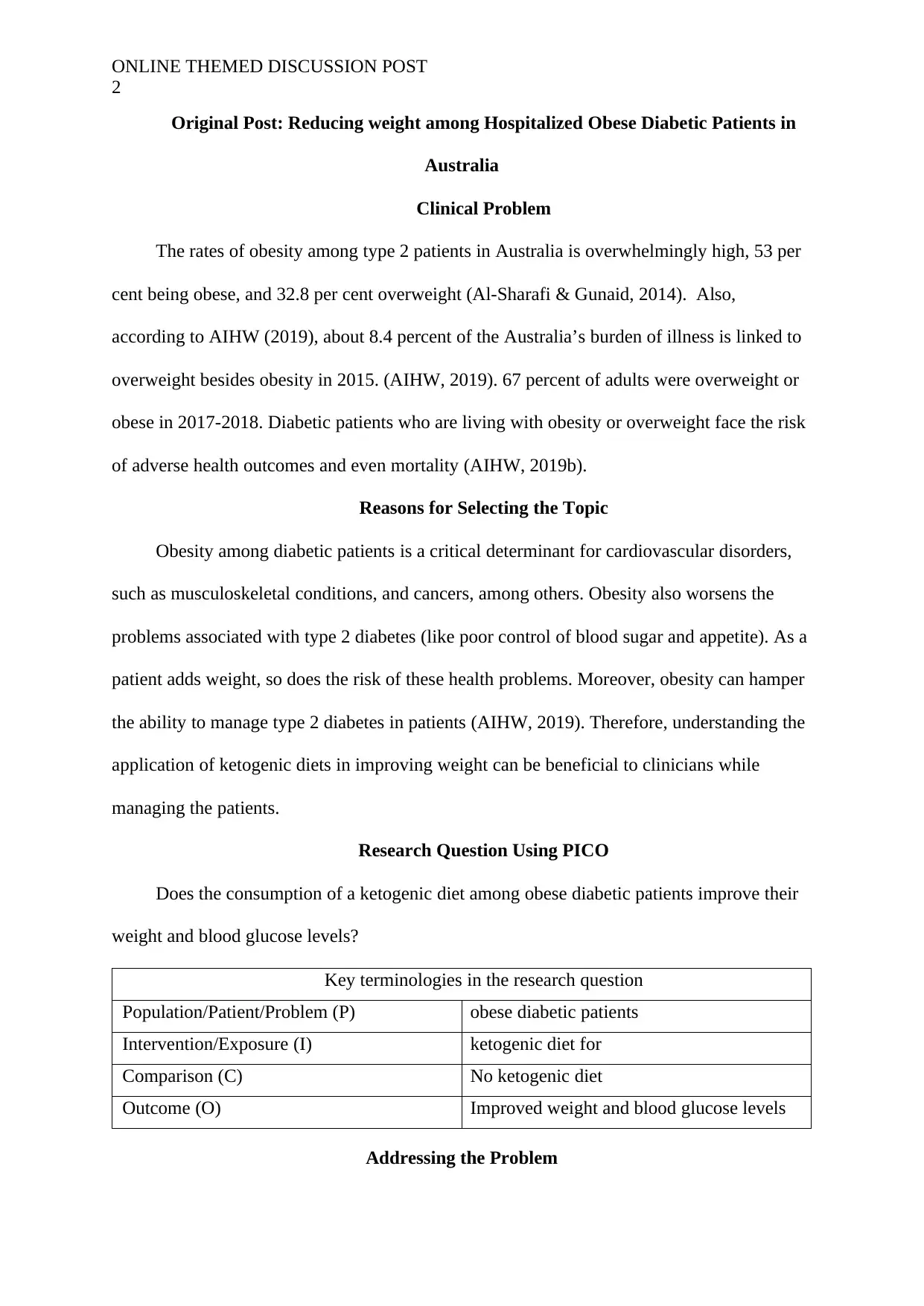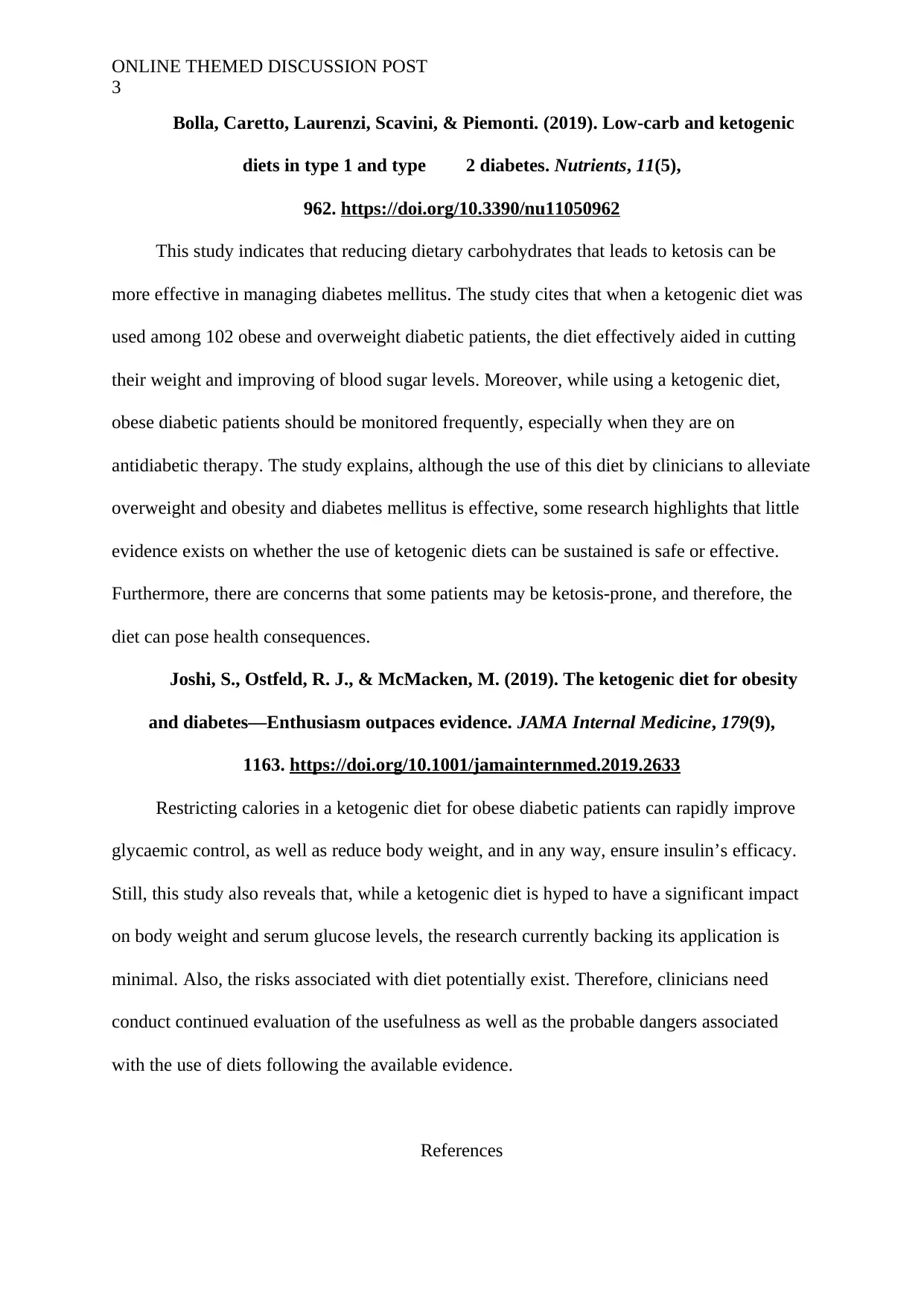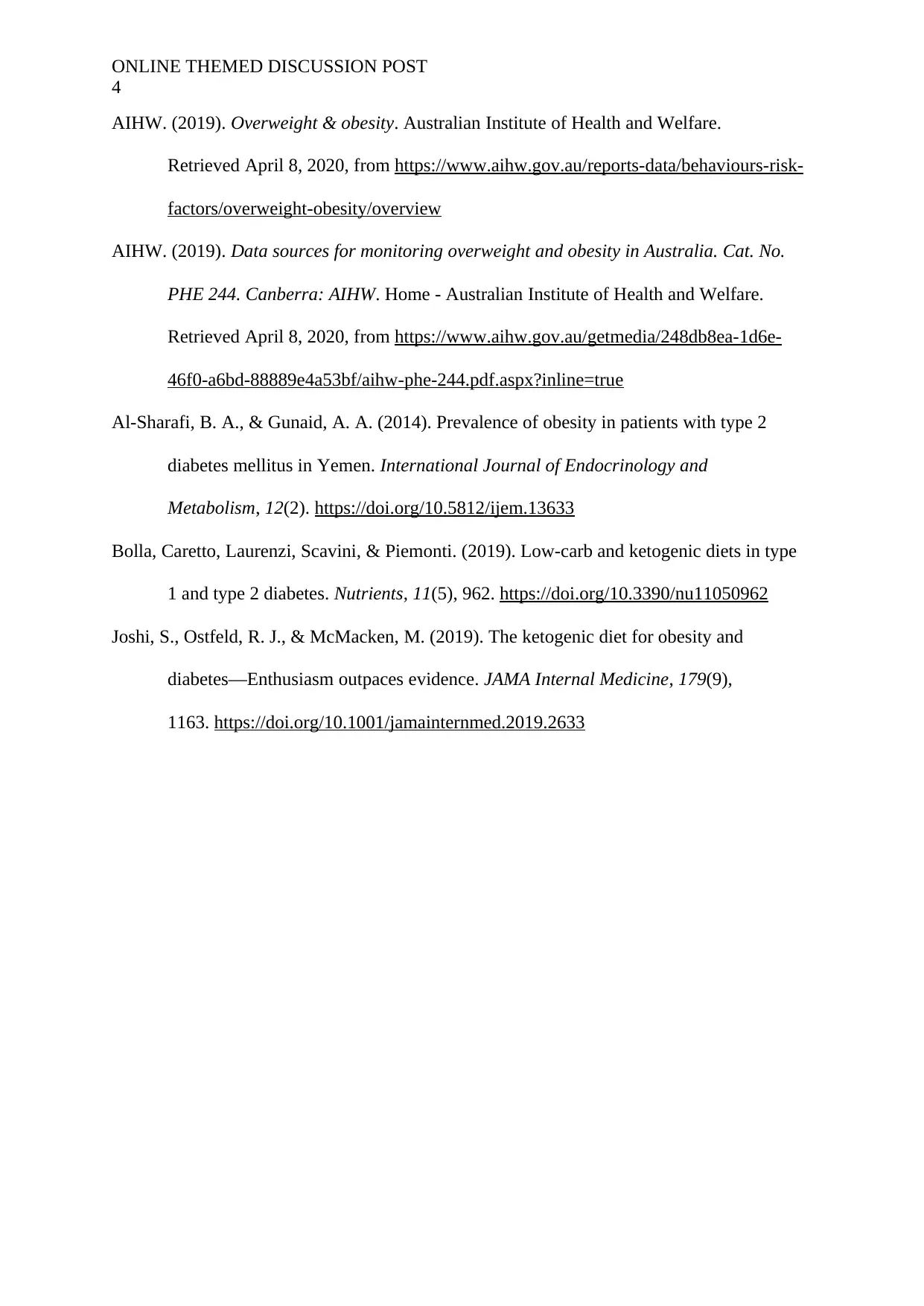Evidence-Based Discussion: Ketogenic Diet for Obese Diabetic Patients
VerifiedAdded on 2022/09/14
|4
|833
|16
Discussion Board Post
AI Summary
This discussion post explores the application of ketogenic diets in managing obese diabetic patients in Australia. The author identifies the high prevalence of obesity among type 2 diabetic patients and its associated health risks, including cardiovascular disorders and worsened blood sugar control. The post formulates a PICO research question to investigate whether ketogenic diets improve weight and blood glucose levels in this population. It reviews two studies, one supporting the effectiveness of ketogenic diets in weight reduction and improved blood sugar levels, and another highlighting the limited evidence and potential risks associated with such diets. The author emphasizes the need for further research and careful monitoring of patients using this diet. The post includes references to relevant literature on the topic.

Running head: THEMED DISCUSSION BOARD 1
Evidence-based Health Research and Practice
Name
Institution
Evidence-based Health Research and Practice
Name
Institution
Paraphrase This Document
Need a fresh take? Get an instant paraphrase of this document with our AI Paraphraser

ONLINE THEMED DISCUSSION POST
2
Original Post: Reducing weight among Hospitalized Obese Diabetic Patients in
Australia
Clinical Problem
The rates of obesity among type 2 patients in Australia is overwhelmingly high, 53 per
cent being obese, and 32.8 per cent overweight (Al-Sharafi & Gunaid, 2014). Also,
according to AIHW (2019), about 8.4 percent of the Australia’s burden of illness is linked to
overweight besides obesity in 2015. (AIHW, 2019). 67 percent of adults were overweight or
obese in 2017-2018. Diabetic patients who are living with obesity or overweight face the risk
of adverse health outcomes and even mortality (AIHW, 2019b).
Reasons for Selecting the Topic
Obesity among diabetic patients is a critical determinant for cardiovascular disorders,
such as musculoskeletal conditions, and cancers, among others. Obesity also worsens the
problems associated with type 2 diabetes (like poor control of blood sugar and appetite). As a
patient adds weight, so does the risk of these health problems. Moreover, obesity can hamper
the ability to manage type 2 diabetes in patients (AIHW, 2019). Therefore, understanding the
application of ketogenic diets in improving weight can be beneficial to clinicians while
managing the patients.
Research Question Using PICO
Does the consumption of a ketogenic diet among obese diabetic patients improve their
weight and blood glucose levels?
Key terminologies in the research question
Population/Patient/Problem (P) obese diabetic patients
Intervention/Exposure (I) ketogenic diet for
Comparison (C) No ketogenic diet
Outcome (O) Improved weight and blood glucose levels
Addressing the Problem
2
Original Post: Reducing weight among Hospitalized Obese Diabetic Patients in
Australia
Clinical Problem
The rates of obesity among type 2 patients in Australia is overwhelmingly high, 53 per
cent being obese, and 32.8 per cent overweight (Al-Sharafi & Gunaid, 2014). Also,
according to AIHW (2019), about 8.4 percent of the Australia’s burden of illness is linked to
overweight besides obesity in 2015. (AIHW, 2019). 67 percent of adults were overweight or
obese in 2017-2018. Diabetic patients who are living with obesity or overweight face the risk
of adverse health outcomes and even mortality (AIHW, 2019b).
Reasons for Selecting the Topic
Obesity among diabetic patients is a critical determinant for cardiovascular disorders,
such as musculoskeletal conditions, and cancers, among others. Obesity also worsens the
problems associated with type 2 diabetes (like poor control of blood sugar and appetite). As a
patient adds weight, so does the risk of these health problems. Moreover, obesity can hamper
the ability to manage type 2 diabetes in patients (AIHW, 2019). Therefore, understanding the
application of ketogenic diets in improving weight can be beneficial to clinicians while
managing the patients.
Research Question Using PICO
Does the consumption of a ketogenic diet among obese diabetic patients improve their
weight and blood glucose levels?
Key terminologies in the research question
Population/Patient/Problem (P) obese diabetic patients
Intervention/Exposure (I) ketogenic diet for
Comparison (C) No ketogenic diet
Outcome (O) Improved weight and blood glucose levels
Addressing the Problem

ONLINE THEMED DISCUSSION POST
3
Bolla, Caretto, Laurenzi, Scavini, & Piemonti. (2019). Low-carb and ketogenic
diets in type 1 and type 2 diabetes. Nutrients, 11(5),
962. https://doi.org/10.3390/nu11050962
This study indicates that reducing dietary carbohydrates that leads to ketosis can be
more effective in managing diabetes mellitus. The study cites that when a ketogenic diet was
used among 102 obese and overweight diabetic patients, the diet effectively aided in cutting
their weight and improving of blood sugar levels. Moreover, while using a ketogenic diet,
obese diabetic patients should be monitored frequently, especially when they are on
antidiabetic therapy. The study explains, although the use of this diet by clinicians to alleviate
overweight and obesity and diabetes mellitus is effective, some research highlights that little
evidence exists on whether the use of ketogenic diets can be sustained is safe or effective.
Furthermore, there are concerns that some patients may be ketosis-prone, and therefore, the
diet can pose health consequences.
Joshi, S., Ostfeld, R. J., & McMacken, M. (2019). The ketogenic diet for obesity
and diabetes—Enthusiasm outpaces evidence. JAMA Internal Medicine, 179(9),
1163. https://doi.org/10.1001/jamainternmed.2019.2633
Restricting calories in a ketogenic diet for obese diabetic patients can rapidly improve
glycaemic control, as well as reduce body weight, and in any way, ensure insulin’s efficacy.
Still, this study also reveals that, while a ketogenic diet is hyped to have a significant impact
on body weight and serum glucose levels, the research currently backing its application is
minimal. Also, the risks associated with diet potentially exist. Therefore, clinicians need
conduct continued evaluation of the usefulness as well as the probable dangers associated
with the use of diets following the available evidence.
References
3
Bolla, Caretto, Laurenzi, Scavini, & Piemonti. (2019). Low-carb and ketogenic
diets in type 1 and type 2 diabetes. Nutrients, 11(5),
962. https://doi.org/10.3390/nu11050962
This study indicates that reducing dietary carbohydrates that leads to ketosis can be
more effective in managing diabetes mellitus. The study cites that when a ketogenic diet was
used among 102 obese and overweight diabetic patients, the diet effectively aided in cutting
their weight and improving of blood sugar levels. Moreover, while using a ketogenic diet,
obese diabetic patients should be monitored frequently, especially when they are on
antidiabetic therapy. The study explains, although the use of this diet by clinicians to alleviate
overweight and obesity and diabetes mellitus is effective, some research highlights that little
evidence exists on whether the use of ketogenic diets can be sustained is safe or effective.
Furthermore, there are concerns that some patients may be ketosis-prone, and therefore, the
diet can pose health consequences.
Joshi, S., Ostfeld, R. J., & McMacken, M. (2019). The ketogenic diet for obesity
and diabetes—Enthusiasm outpaces evidence. JAMA Internal Medicine, 179(9),
1163. https://doi.org/10.1001/jamainternmed.2019.2633
Restricting calories in a ketogenic diet for obese diabetic patients can rapidly improve
glycaemic control, as well as reduce body weight, and in any way, ensure insulin’s efficacy.
Still, this study also reveals that, while a ketogenic diet is hyped to have a significant impact
on body weight and serum glucose levels, the research currently backing its application is
minimal. Also, the risks associated with diet potentially exist. Therefore, clinicians need
conduct continued evaluation of the usefulness as well as the probable dangers associated
with the use of diets following the available evidence.
References
⊘ This is a preview!⊘
Do you want full access?
Subscribe today to unlock all pages.

Trusted by 1+ million students worldwide

ONLINE THEMED DISCUSSION POST
4
AIHW. (2019). Overweight & obesity. Australian Institute of Health and Welfare.
Retrieved April 8, 2020, from https://www.aihw.gov.au/reports-data/behaviours-risk-
factors/overweight-obesity/overview
AIHW. (2019). Data sources for monitoring overweight and obesity in Australia. Cat. No.
PHE 244. Canberra: AIHW. Home - Australian Institute of Health and Welfare.
Retrieved April 8, 2020, from https://www.aihw.gov.au/getmedia/248db8ea-1d6e-
46f0-a6bd-88889e4a53bf/aihw-phe-244.pdf.aspx?inline=true
Al-Sharafi, B. A., & Gunaid, A. A. (2014). Prevalence of obesity in patients with type 2
diabetes mellitus in Yemen. International Journal of Endocrinology and
Metabolism, 12(2). https://doi.org/10.5812/ijem.13633
Bolla, Caretto, Laurenzi, Scavini, & Piemonti. (2019). Low-carb and ketogenic diets in type
1 and type 2 diabetes. Nutrients, 11(5), 962. https://doi.org/10.3390/nu11050962
Joshi, S., Ostfeld, R. J., & McMacken, M. (2019). The ketogenic diet for obesity and
diabetes—Enthusiasm outpaces evidence. JAMA Internal Medicine, 179(9),
1163. https://doi.org/10.1001/jamainternmed.2019.2633
4
AIHW. (2019). Overweight & obesity. Australian Institute of Health and Welfare.
Retrieved April 8, 2020, from https://www.aihw.gov.au/reports-data/behaviours-risk-
factors/overweight-obesity/overview
AIHW. (2019). Data sources for monitoring overweight and obesity in Australia. Cat. No.
PHE 244. Canberra: AIHW. Home - Australian Institute of Health and Welfare.
Retrieved April 8, 2020, from https://www.aihw.gov.au/getmedia/248db8ea-1d6e-
46f0-a6bd-88889e4a53bf/aihw-phe-244.pdf.aspx?inline=true
Al-Sharafi, B. A., & Gunaid, A. A. (2014). Prevalence of obesity in patients with type 2
diabetes mellitus in Yemen. International Journal of Endocrinology and
Metabolism, 12(2). https://doi.org/10.5812/ijem.13633
Bolla, Caretto, Laurenzi, Scavini, & Piemonti. (2019). Low-carb and ketogenic diets in type
1 and type 2 diabetes. Nutrients, 11(5), 962. https://doi.org/10.3390/nu11050962
Joshi, S., Ostfeld, R. J., & McMacken, M. (2019). The ketogenic diet for obesity and
diabetes—Enthusiasm outpaces evidence. JAMA Internal Medicine, 179(9),
1163. https://doi.org/10.1001/jamainternmed.2019.2633
1 out of 4
Related Documents
Your All-in-One AI-Powered Toolkit for Academic Success.
+13062052269
info@desklib.com
Available 24*7 on WhatsApp / Email
![[object Object]](/_next/static/media/star-bottom.7253800d.svg)
Unlock your academic potential
Copyright © 2020–2026 A2Z Services. All Rights Reserved. Developed and managed by ZUCOL.




